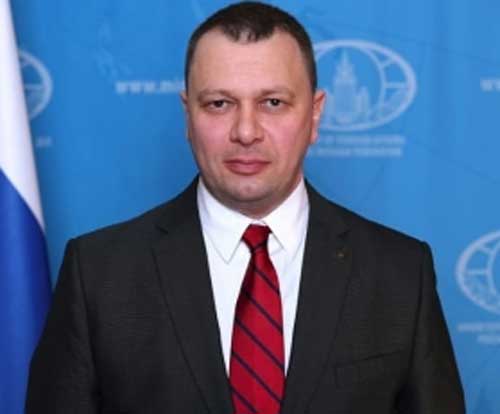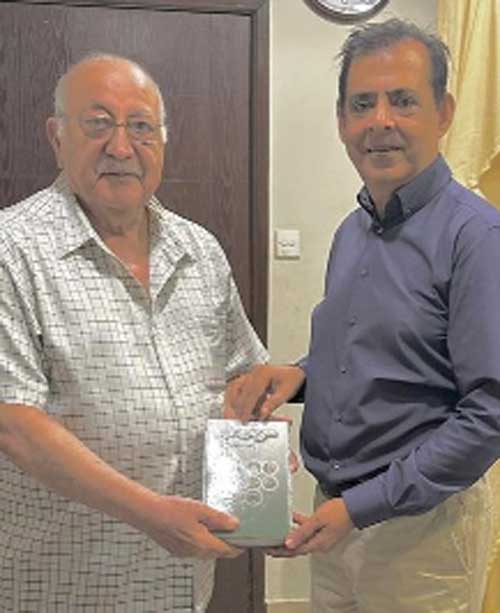Dr. Muhammad Ali Ehsan
An interview with the Russian Consul General of the Russian Federation in Karachi, Andrey Viktorovich Fedorov, that took place Fridary. The rendering of the interview is produced as below:
Q. What is the historical perspective of war in Ukraine? What are the reasons for Russia to invade Eastern Ukraine and why are they justified?
A. Dr. Ehsan, let me clarify a couple of very important things. First of all, it is not a “war”; it is a special military operation, which was launched in accordance with Article 51 of the UN Charter and in execution of the Treaties of friendship and mutual assistance with the Donetsk People’s Republic and the Lugansk People’s Republic.
The primary objective of this operation is to give the citizens of these republics protection from the anti-Russian Kiev regime. You shall remember that after the coup in the early 2014 one of the first declarations of the new Kiev junta was to abolish the official status of the Russian language. In a country where more than half of the people speak Russian on a daily basis, it sparkled huge outrage, especially in the Eastern regions. The people of Crimea and Donbas clearly stated that they did not want to live in such a country. As it was mentioned by our foreign minister Sergey Lavrov, “by treating its own citizens in this way, the Kiev regime undermined its own territorial integrity.
The UN General Assembly’s declaration on Principles of International Law states that territorial integrity of states must be respected if their governments adhere to the principle of self-determination of peoples and represent the entire population residing within the borders of the territories in question”. This subsequently means that the actions of Russia do not fit any criteria of “invasion”. It was an act of defending Russian-speaking people from the aggression of the neo-Nazi government in Kiev.
Another thing worth mentioning is the stubborn and aggressive position of NATO military alliance, eastward expansion of which started creating security threats for Russia. For the last nine years all the proposals on the mutual security measures, which Russia put forward, were completely disregarded by our Western “partners”.
In this regard, the Russian foreign minister Sergey Lavrov underlined that “the Westerners realized that all their plans to turn Ukraine into “anti-Russia” and organize a bridgehead for deterring Russia on its territory have failed. They understood that our patience is not limitless and that for many years, since President Vladimir Putin’s speech in Munich in 2007 we warned them that it is unacceptable to expand NATO eastward, ignore the assurances and promises given to the leaders of the USSR and later Russia, completely neglect our lawful security interests and refuse to fulfil their commitment not to enhance NATO’s security at the expense Russia’s security”. Thus, I believe that the decision of our President to declare a special military operation was completely reasonable and justified.
Q. Why does Russia call this “special military operation” and not “war”?
A. As you may understand very well, the state of war implies a special legal and diplomatic status. For example, during war all cooperation tracks and diplomatic relations are terminated. It has not happen this time; the now suspended infamous “Grain deal” was one of the best examples of it. Another point is that during a special operation the scope and intensity of military actions are severely limited.
Even at the current times, Russia has not launched a full-scale offense and have not mobilized its resources as Ukraine has done. Special military operation also means “peace enforcement”, which is a primary objective of our policy in the region. What is also worth mentioning is that Ukraine itself have not formally declared a “war” against Russia. To be more precise, they have declared “martial law”, but not war. This means that even Ukrainian rulers deep down in their heart treat this conflict as something different from war in its conventional terms.
Q. It is easy to start a war, but difficult to end it. How does Russia see the end of this war, how and when it would end?
A. Two things about this special military operation are self-evident and conclusive. First, all conflicts always end at the negotiation table, and the current one will not be an exception. Second thing is that Ukraine just cannot win. To divert this conflict into attrition phase against Russia was not the brightest idea, taking into consideration the resilience of our country. Any form of assistance that the West provides for Ukraine is just delaying the inevitable.
The recent so-called counteroffensive is just another manifestation of this. As it was confirmed by Russian President Vladimir Putin “since the start of the counteroffensive, the Ukrainian army has lost 71,500 troops. And they want to achieve results at any cost, as they say. Sometimes it seems as if these are not even their own people that they are throwing into this counteroffensive; it is as if they are not their own people. They have suffered significant losses, including 543 tanks and nearly 18,000 armoured vehicles of various classes, and so on”.
As for the terms of the end of the conflict, I am not a representative of the meteorological department to make any predictions on the exact time and procedures. Many factors can interrupt and influence the course of military action and future peaceful process. However, that does not change the inevitable result that Ukraine and its Western puppeteers will have to face in the future.
Q. How are Western sanctions affecting Russian economy and its ability to fight the war?
A. In short, the effect is minimal. I will not goto the extreme and say that the sanctions have not influenced our economy at all. They initially hit us in some spheres, but our government and businesspeople have been able toadapt swiftly. This was demonstrated by the recent remarkable figures. According to the World Bank, in 2022 the Russian economy has become a fifth largest by the GDP measured by purchasing power parity. What is more, this year Russian economy has been enjoying a steady growth.
According to the Russian Bureau of Statistics, in the second quarter of 2023 Russian GDP increased by 4.9 per cent, one of the fastest paces in the world. At the same time, most important thing that you have to keep in mind is that these sanctions are completely illegal. Any sanctions can be imposed only by the UN and not by any nation unilaterally. Nevertheless, to sum up all the indicators, the West has once again failed to weaken the economy of Russia, as it has only become much stronger.
Q. Is there a diplomatic solution to the problem? What is Russian stance on diplomacy being given an opportunity to succeed?
A. As I have already mentioned, the solution of this conflict can only be found in diplomatic perspective at the negotiation table. Russia has always tried to seek a diplomatic way of the solution, but each time it were precisely the Western powers that interrupted the talks. Just recently, Russian President Vladimir Putin said regarding the negotiations process that “if the United States believes that Ukraine is ready to talk, then let it start by rescinding the Ukrainian President’s executive order that prohibits talks.
There is a presidential executive order in which he prohibits himself and everyone else from holding talks”. Before that, we had several rounds round of talks in Minsk and Istanbul. Some of the terms had already been worked out, but then the USA and the UK pressured Ukraine into suspending the whole negotiation process. Thus, their complaints about Russia not willing to talk is just another example of their uncovered hypocrisy.
Another reason why it is very hard to negotiate with Ukraine and the West is that they never fulfil their given promises. This was the case with the Black Sea initiative or the “Grain deal”. President of Russia Vladimir Putin has said clearly and repeatedly that when every effort is made to eliminate all obstacles for our fertiliser and grain exports, we will return to the collective implementation of the Ukrainian part of the Black Sea initiative on that same day. To make a conclusion, we are always ready for negotiations. It is their turn to demonstrate the same intentions and start fulfilling their promises.




